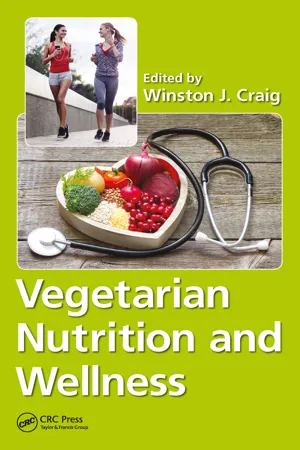
Vegetarian Nutrition and Wellness
Winston J. Craig, Winston J. Craig
- 332 pages
- English
- ePUB (adapté aux mobiles)
- Disponible sur iOS et Android
Vegetarian Nutrition and Wellness
Winston J. Craig, Winston J. Craig
À propos de ce livre
A large amount of research effort goes into assessing the health benefits of a plant-based diet, resulting from human desire to consume a more sustainable diet that is less destructive of the earth's natural resources. In addition, a growing number of people are choosing the vegan or total vegetarian diet because of the potential to greatly reduce the risk of chronic diseases and mortality rates. Although this interest in plant-based eating is popular, there exist concerns on the safety of some vegetarian diets, especially a vegan diet. This book describes issues of the vegetarian diet and outlines ways to prevent nutrient deficiencies.
Vegetarian Nutrition and Wellness focuses on synthesizing research around vegetarian diets and human health. A major section of the book deals with how a vegetarian diet protects population groups from the major chronic diseases, such as cardiovascular diseases, obesity, and various cancers. Based upon ecological and clinical studies, chapter authors explain the health-promoting properties of plant-based diets, and compare/contrast health outcomes obtained from consuming omnivorous diets with a vegetarian or vegan diet. Fruits and vegetables figure prominently in vegetarian diets and provide a substantial effect in disease reduction and health-promoting properties of a plant-based diet.
Vegetarian Nutrition and Wellness is written for the academic community, registered dietitians, health professionals, and graduate students in nutrition and public health. Each chapter provides a comprehensive review of the scientific literature and includes a concise summary at the beginning of each chapter. The time is ripe for this book to update the scientific community with a collage of well-documented topics on vegetarian nutrition.